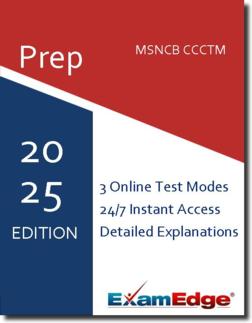MSNCB CCCTM (CCCTM) Practice Tests & Test Prep by Exam Edge - FAQ
Based on 29 Reviews
- Real Exam Simulation: Timed questions and matching content build comfort for your MSNCB CCCTM test day.
- Instant, 24/7 Access: Web-based MSNCB Certified in Care Coordination and Transition Management practice exams with no software needed.
- Clear Explanations: Step-by-step answers and explanations for your exam to strengthen understanding.
- Boosted Confidence: Reduces anxiety and improves test-taking skills to ace your MSNCB Certified in Care Coordination and Transition Management (CCCTM).

Why should I use Exam Edge to prepare for the MSNCB Certified in Care Coordination and Transition Management Exam?
FAQ's for Exam Edge MSNCB Certified in Care Coordination and Transition Management practice tests
- Comprehensive content: Exam Edge's MSNCB Certified in Care Coordination and Transition Management practice tests are created specifically to prepare you for the real exam. All our MSNCB CCCTM practice test questions parallel the topics covered on the real test. The topics themselves are covered in the same proportions as the real test too, based on outlines provided by the Medical-Surgical Nursing Certification Board in their MSNCB CCCTM test guidelines.
- Realistic practice: Our MSNCB CCCTM practice exams are designed to help familiarize you with the real test. With the same time limits as the real exam, Our MSNCB practice tests enable you to practice your pacing and time management ahead of test day.
- Detailed explanations: As you complete your practice tests, we show you which questions you answered correctly and which ones you answered incorrectly, in addition to providing you with detailed step-by-step explanations for every single MSNCB Certified in Care Coordination and Transition Management practice exam question.
- Performance insights: After you complete a practice test, we provide you with your raw score (how many you answered correctly) and our estimate of the MSNCB CCCTM score you would have received if you had taken the real test.
- Ease of access: Because all Our MSNCB practice tests are web-based, there is no software to install. You can take MSNCB CCCTM practice exams on any device with access to the internet, at any time.
- Flexible use: If you must pause while taking one of Our MSNCB practice exam, you can continue right where you left off. When you continue the test, you will start exactly where you were, and with the same amount of time you had remaining.
- Thousands of unique questions: We offer 15 different online practice exams with 1,500 unique questions to help you prepare for your MSNCB Certified in Care Coordination and Transition Management !
- Low cost: The cost of ordering 5 practice tests is less than the cost of taking the real MSNCB CCCTM test. In other words, it would be less expensive to order 5 practice tests than to retake the real MSNCB Certified in Care Coordination and Transition Management exam!
- Our trusted reputation: As a fully accredited member of the Better Business Bureau, we uphold the highest level of business standards. You can rest assured that we maintain all of the BBB Standards for Trust.
- Additional support: If you need additional help, we offer specialized tutoring. Our tutors are trained to help prepare you for success on the MSNCB Certified in Care Coordination and Transition Management exam.
What score do I need to pass the MSNCB CCCTM Exam?
To pass the MSNCB Certified in Care Coordination and Transition Management test you need a score of 71.
How do I know the practice tests are reflective of the actual MSNCB Certified in Care Coordination and Transition Management ?
At Exam Edge, we are proud to invest time and effort to make sure that Our MSNCB practice tests are as realistic as possible. Our practice tests help you prepare by replicating key qualities of the real test, including:
- The topics covered
- The level of difficulty
- The maximum time-limit
- The look and feel of navigating the exam
Do you offer practice tests for other Medical-Surgical Nursing Certification Board subjects?
Yes! We offer practice tests for 2 different exam subjects, and there are 40 unique exams utilizing 4000 practice exam questions. Every subject has a free sample practice test you can try too!
MSNCB CMSRN
(CMSRN
®
)
Practice Tests
MSNCB CCCTM
(CCCTM
™
)
Practice Tests
To order tests, or take a sample test, for a different subject:
Click on ' Name on the Exam Name' You will be take to the orders page
How do I register for the real Medical-Surgical Nursing Certification Board?
For up-to-date information about registration for the Medical-Surgical Nursing Certification Board, refer to the Medical-Surgical Nursing Certification Board website.


